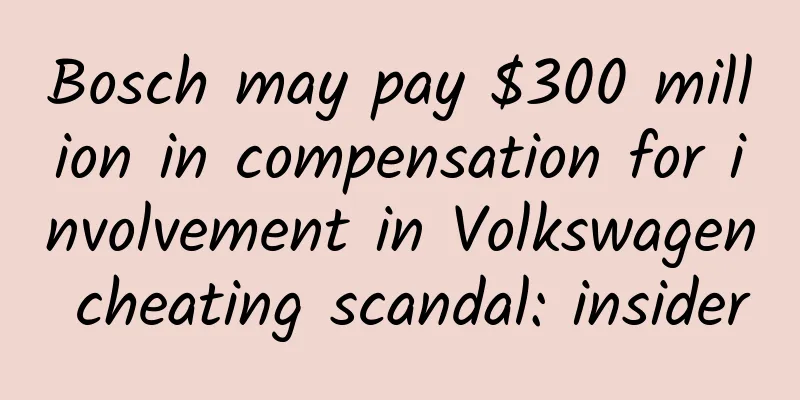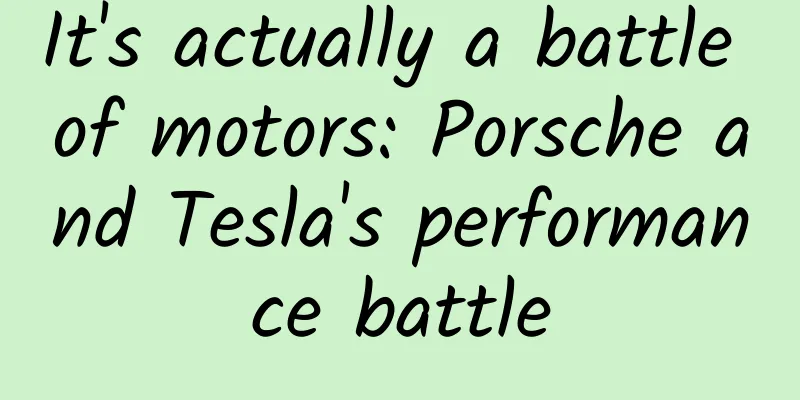Bosch may pay $300 million in compensation for involvement in Volkswagen cheating scandal: insider

|
German auto parts supplier Bosch was previously sued by American car owners for its alleged involvement in the Volkswagen emissions cheating scandal. According to Reuters, on December 19, a person familiar with the matter revealed that Bosch had reached a settlement with American car owners and would end the case for $300 million. A spokesman for the prosecutor's office said that Bosch's role in the Volkswagen cheating incident is still under investigation. In 2015, American Volkswagen diesel car owners sued Bosch, claiming that it helped Volkswagen develop emission test cheating software and pointed out that Bosch has been an "active participant" in Volkswagen's decade-long cheating plan. Bosch previously considered the accusation of American car owners to be "barbaric and unfounded." Bosch Chairman Volkmar Denner ordered an internal investigation in January 2016 and said he would actively cooperate with regulators. In April this year, Denner revealed that Bosch had set aside 650 million euros to deal with potential legal action. Reuters reported last year that the U.S. Department of Justice was also investigating whether Bosch was involved in the Volkswagen cheating incident. According to people familiar with the matter, Bosch's solution to the car owners' complaints is very important to Volkswagen's final handling method. In November this year, Reuters reported that Volkswagen may buy back about 20,000 Volkswagen diesel vehicles with excessive emissions and repair the remaining vehicles. After intense negotiations last weekend, Volkswagen and the car owners' lawyers should soon reach an agreement on compensation for the car owners. At a short court hearing in San Francisco on December 19, U.S. District Judge Charles Breyer said that negotiations are still continuing in Washington and a solution for the 3.0-liter diesel car is expected to be reached on December 20. According to Reuters on December 16, Volkswagen's U.S. 3.0-liter diesel vehicle treatment plan includes agreeing to pay $200 million to reduce air pollution, and agreeing to buy back 20,000 vehicles and repair 60,000 diesel vehicles with excessive emissions. In June this year, Volkswagen agreed to buy back or repair about 475,000 2.0-liter diesel vehicles in the United States with excessive pollution for $10 billion. The amount of compensation for the 3.0-liter diesel cars is uncertain because the number of owners who choose to buy them back is not yet clear, but two people familiar with the matter said it would exceed $1 billion. According to Reuters, as of press time, Volkswagen has agreed to pay $16.5 billion for the cheating scandal, including fees paid to dealers, state governments, new energy projects, and car owners' lawyers. As a winner of Toutiao's Qingyun Plan and Baijiahao's Bai+ Plan, the 2019 Baidu Digital Author of the Year, the Baijiahao's Most Popular Author in the Technology Field, the 2019 Sogou Technology and Culture Author, and the 2021 Baijiahao Quarterly Influential Creator, he has won many awards, including the 2013 Sohu Best Industry Media Person, the 2015 China New Media Entrepreneurship Competition Beijing Third Place, the 2015 Guangmang Experience Award, the 2015 China New Media Entrepreneurship Competition Finals Third Place, and the 2018 Baidu Dynamic Annual Powerful Celebrity. |
>>: Volvo confirms listing plan, Geely's equity dilution
Recommend
The most complete and detailed APP promotion channels and planning schemes in history
For a successful application, developing the APP ...
The collision between the prophet and the pioneer: Kevin Kelly's trend interpretation coincides with Suning's transformation practice
Who says the future is unpredictable? As early as...
Decoding: How does Pinduoduo play with the addiction model?
Pinduoduo has a variety of promotion methods, whi...
More than 90% of copywriting persuades consumers from these five dimensions
There are many ways to write copy with the ultima...
Ocean Love Story Series | Ashi's Old Grave Together: Childhood sweethearts, living together till death
01 Holding hands with you, growing old together A...
Dance Steps and Emotions "Teasing 5 Boys to Men" Watermark-free PDF e-book
Dance Steps and Emotions "How to Flirt with ...
Schools of programming
[[142408]] There are always people who like to ar...
New media operations: 8 ways to follow hot topics
The author of this article provides 8 ways (ideas...
Acting bravely should be praised, but blind rescue is not recommended! You deserve the correct rescue method...
Late night on March 13 Ningde Xiapu County People...
Beware! Be careful when this screen appears on WeChat! These 15 minutes are critical
When using WeChat to transfer money If your phone...
Increase followers by 100,000 in 30 days, a strategy for rapid increase of followers through social operation!
User interaction after community operations is ve...
What makes Apple users so loyal? What can Chinese smartphones learn from?
In the field of smart phones, iPhone user loyalty...
Community operation: How to create a community marketing campaign?
How to use the five-step method of social marketi...
Paving the way for the next generation, the HOME button is the best update of iPhone 7
The iPhone has been on the market for a while now,...









